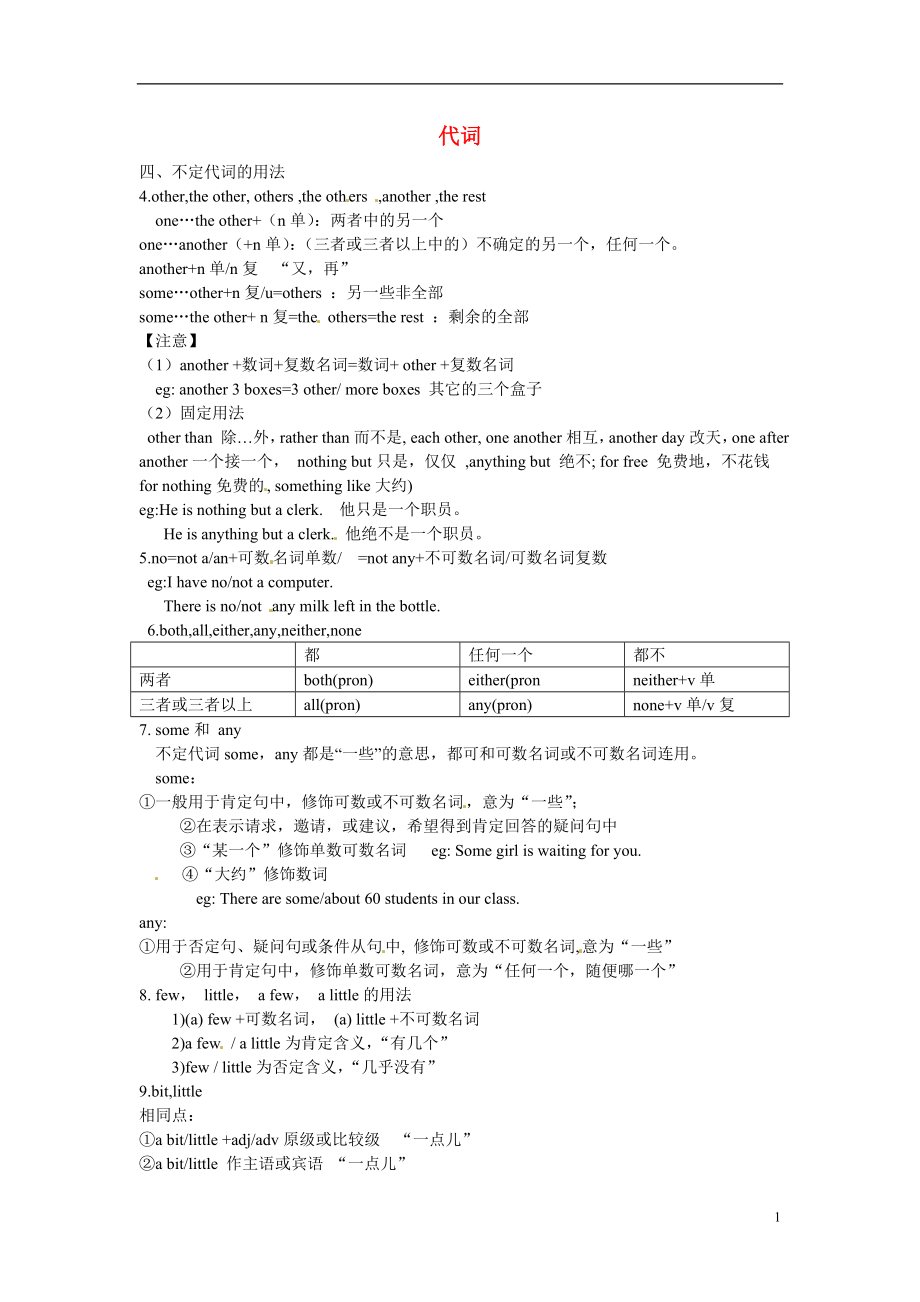《河北省撫寧縣第六中學(xué)2013-2014學(xué)年高二英語 代詞學(xué)案2》由會員分享��,可在線閱讀��,更多相關(guān)《河北省撫寧縣第六中學(xué)2013-2014學(xué)年高二英語 代詞學(xué)案2(2頁珍藏版)》請在裝配圖網(wǎng)上搜索。
1�����、
代詞
四����、不定代詞的用法
4.other,the other, others ,the others ,another ,the rest
one…the other+(n單):兩者中的另一個
one…another(+n單):(三者或三者以上中的)不確定的另一個,任何一個����。
another+n單/n復(fù) “又,再”
some…other+n復(fù)/u=others :另一些非全部
some…the other+ n復(fù)=the others=the rest :剩余的全部
【注意】
(1)another +數(shù)詞+復(fù)數(shù)名詞=數(shù)詞+ other +復(fù)數(shù)名詞
eg: ano
2���、ther 3 boxes=3 other/ more boxes 其它的三個盒子
(2)固定用法
other than 除…外����,rather than而不是, each other, one another相互���,another day改天,one after another一個接一個���, nothing but只是�,僅僅 ,anything but 絕不; for free 免費(fèi)地���,不花錢
for nothing免費(fèi)的, something like大約)
eg:He is nothing but a clerk. 他只是一個職員���。
He is anything
3、 but a clerk. 他絕不是一個職員。
5.no=not a/an+可數(shù)名詞單數(shù)/ =not any+不可數(shù)名詞/可數(shù)名詞復(fù)數(shù)
eg:I have no/not a computer.
There is no/not any milk left in the bottle.
6.both,all,either,any,neither,none
都
任何一個
都不
兩者
both(pron)
either(pron
neither+v單
三者或三者以上
all(pron)
any(pron)
none+v單/v復(fù)
7. some和 any
4�����、
不定代詞some��,any都是“一些”的意思���,都可和可數(shù)名詞或不可數(shù)名詞連用���。
some:
①一般用于肯定句中��,修飾可數(shù)或不可數(shù)名詞����,意為“一些”;
②在表示請求��,邀請,或建議�����,希望得到肯定回答的疑問句中
③“某一個”修飾單數(shù)可數(shù)名詞 eg: Some girl is waiting for you.
④“大約”修飾數(shù)詞
eg: There are some/about 60 students in our class.
any:
①用于否定句、疑問句或條件從句中, 修飾可數(shù)或不可數(shù)名詞,意為“一些”
5��、
②用于肯定句中���,修飾單數(shù)可數(shù)名詞�����,意為“任何一個,隨便哪一個”
8. few���, little���, a few����, a little的用法
1)(a) few +可數(shù)名詞���, (a) little +不可數(shù)名詞
2)a few / a little為肯定含義�,“有幾個”
3)few / little為否定含義��,“幾乎沒有”
9.bit,little
相同點(diǎn):
①a bit/little +adj/adv原級或比較級 “一點(diǎn)兒”
②a bit/little 作主語或賓語 “一點(diǎn)兒”
不同點(diǎn):
①not a bit = not at all “一點(diǎn)也不”
6���、 not a little = very(much) “非?!?
②a bit of +n “一點(diǎn)兒,有點(diǎn)兒” a little +u (名詞前有限定詞時加of)
四�����、指示代詞this, that, these, those
①this ,these 時間或空間上的“近指”�,可與here連用��;that ,those是“遠(yuǎn)指”�,與there連用�。
②指上文提到的事一般用that,有時也用this;指下文的事只能用this�����。
③打電話時�,用this 來介紹自己,用that來問對方����,而不用I或you.
④this和that可表程度����,意為“如此,那么”,相當(dāng)于so��,作狀語��。
五��、全部否定和部分否定
All ,both, every及由every構(gòu)成的不定代詞(everyone ,everybody ,everything ,every+n)等表全部肯定的不定代詞;
everywhere, always, altogether(全然地)�����,wholly(全部地)等表總括性的副詞
與not連用時,無論not放在何處���,都表部分否定。意為“并非全都…,并非每一個都…�,并非總是….”
表全部否定應(yīng)用no one ,none, neither, nobody, nothing, not…any及no+n
2
 河北省撫寧縣第六中學(xué)2013-2014學(xué)年高二英語 代詞學(xué)案2
河北省撫寧縣第六中學(xué)2013-2014學(xué)年高二英語 代詞學(xué)案2

